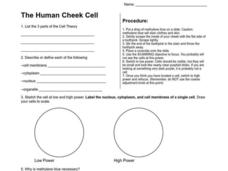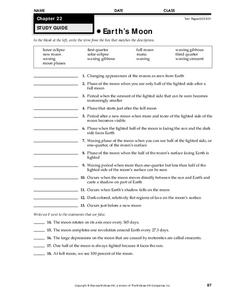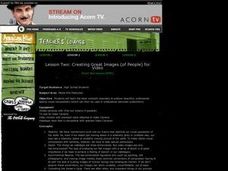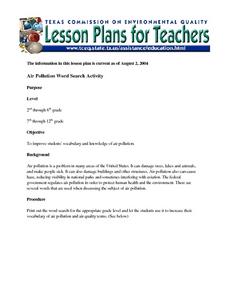Curated OER
Electrons and Atoms
In this atoms worksheet, students determine the velocity, wavelength, power, and frequency of given atoms. Student describe wave-particle duality and give the principle and angular quantum numbers for given orbitals. This worksheet has...
Curated OER
Night Sky
Learners discover why stars can only be seen at night. They participate in a read aloud of, "Night Sky" by Carole Stott and, "Switch on the Night" by Ray Bradbury. Using the sky objects described in the readings, they brainstorm and list...
Curated OER
Meteors
Students identify the different types of meteorite using an interactive website. In this earth science lesson, students simulate how meteors crash on a surface. They relate meteor size to crater size.
Curated OER
The Human Cheek Cell
In this human cells activity, 7th graders complete a science experiment using human cheek cells. Students sketch the cells at high and lower power and label the cell nucleus, cytoplasm, and cell membrane.
Curated OER
A Look At Sunspots
Students research how the development of new technology has increased our knowledge of how the sun works. This lesson is part of a three-part series aimed at showing students how our knowledge of the universe must be inferred through the...
Curated OER
Underneath the Microscope
Eighth graders enhance their skills in operating a microscope. They become comfortable with the vocabulary associated with microscopes and investigate how to place slides and focus them properly using the microscope. Students are given...
Curated OER
Earth's Moon
In this moon worksheet, students review the different phases of the moon and differences between a lunar and solar eclipse. This worksheet has 13 fill in the blank and 5 true or false questions.
Curated OER
Exploring the Night Sky: Fall/Winter
Students explain how moon phases occur. They explain three ways that the night sky has been used through history. Students locate some of the constellations in the night sky. They discuss stories and myths surrounding stars.
Curated OER
Quiz: Astronomy
In this science worksheet, 3rd graders will focus on various aspects of astronomy. Students will respond to ten questions all pertaining to stars, constellations, planets, and our solar system.
Curated OER
Tools of Modern Astronomy
Students describe the electromagnetic spectrum and astronomy. For this astronomy lesson students complete an activity, predict what will happen and complete a worksheet.
Curated OER
There Is/Are - Counting Stars
In this counting stars worksheet, students fill in the blanks to a passage, complete the questions, and write sentences with possessive forms. Students complete 3 activities.
Curated OER
Asteroids
Students examine the different types of asteroids and how they enter the atmosphere. In this space lesson students use mashed potatoes to create an asteroid they can eat.
Curated OER
Knowledge Quiz: The Universe
In this universe quiz worksheet, students complete a set of 10 multiple choice questions that cover a variety of concepts about the universe: constellations, black holes, the solar system, etc.
Curated OER
Constellations
Students explore the major constellations. After reviewing the Earth's basic motions and their significance, students discuss the moon's orbit and revolutions. Using a Digitarium Alpha portable planetarium projector, they observe at...
Curated OER
Lesson Two: Creating Great Images (of People) for Video
High schoolers study basic concepts necessary to produce beautiful, professional looking visual compositions (which can then be used in professional television productions).
Curated OER
Hang a Million
Students hang 200 sheets of paper, each with 5000 X's, around the classroom.When completed, this gives them a concrete example of 1,000,000 which is useful in getting a feel for the lengths of time involved in evolution.
Curated OER
Investigating the Behavior of Lumbriculus
Students perform a classroom experiment on the organisms of worms. They view the behaviors of the worms and analyze their results. This lesson introduces students to the techniques involved in behavioral studies.
Curated OER
Quiz: Weather Phenomena #1
In this science worksheet, 3rd graders focus on the weather. Students respond to ten multiple choice questions about various aspects pertaining to our weather.
Curated OER
Science - 'Why does the wind blow?'
For this earth science worksheet, learners read a poem about the wind and learn why the wind blows. After reading the poem and informative paragraphs that follow it, students answer 2 questions regarding the information they read....
Curated OER
American Disaster Quiz
In this weather disasters worksheet, students match words to definitions about weather disasters. Students complete 10 matches total.
Curated OER
Making Waves with the Electromagnetic Spectrum
Pupils explore various types of electromagnetic waves, the range of the spectrum, and common sources of electromagnetic waves.
Curated OER
Where Does the Green Go?
Students investigate why green leaves change colors in the fall. They press leaves and write a poem, create a chlorophyll leaf print, take a nature walk, and create a leaf shape poster.
Curated OER
Air Pollution Word Search Activity
Students examine the issues surrounding air pollution. They discover how it affects peoples health and the government's regulations. They complete a word search activity to practice the vocabulary.
Curated OER
The Goldilocks Principle: A Model of Atmospheric Gases
Pupils discuss the characteristics of the Goldilocks Principle. They discover the pressure and chemical composition of Venus and Mars. They discuss how the Earth's temperature is affected by the atmosphere.
Other popular searches
- Visible Light Spectrum
- Visible Light and Color
- Visible Light Middle School
- Properties of Visible Light
- Visible Light Color
- Wavelength Visible Light
- Wavelength, Visible Light
- Visible Spectrum Worksheet
- Science Visible Light

























